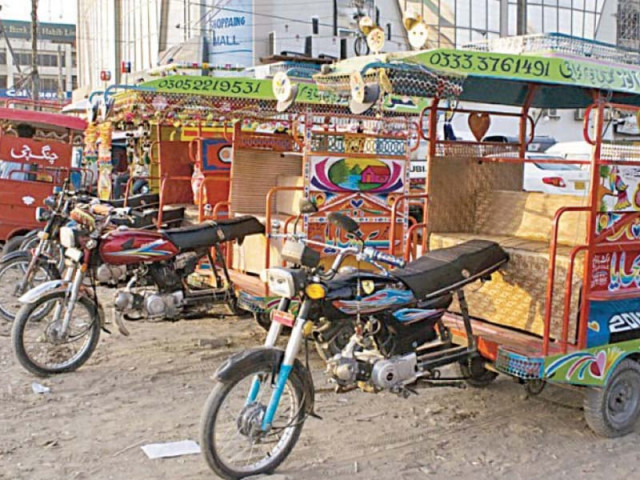Wheels within wheels: Pickups, coasters, rickshaws fill vacuum created after Qingqi ban
Experts fear lack of transport options from govt will worsen the crisis

Nine-seat Qingqi rickshaws were banned by the Sindh High Court, on the pretext that they are unsafe. To cater for the transport need, Suzuki pick-ups and two-seat rickshaws are filling the void. PHOTO: FILE
It was 5:30pm on Thursday when Sibte Hassan, a student of Karachi University (KU), was standing at Nipa Chowrangi, anxiously waiting for some mode of transport that would take him to his house near Nagan Chowrangi.
Hassan wasn't alone. The bus stop was thronged by a large number of people who commute through public transport. All of a sudden, a coaster minibus halted in front of them and a middle-aged man popped out and hollered, "Nagan, Nagan." Hassan, along with the other male commuters at the bus stop, immediately hopped on. However, according to him, the female commuters took a while to board the minibus as they found it unsafe to travel in a vehicle that was not registered.
Suzuki pickups, coaster minibuses and two-seat rickshaws are now filling the vacuum created after the ban imposed on Qingqi rickshaws in the city. According to another student of KU, Asad, the trend of Suzuki pick-up vans as a mode of transport has visibly sprung up in the city. He used to travel in a Qingqi every day in the morning from Nipa Chowrangi to the Silver Jubilee Gate of KU. "But now I hop on the Suzuki pick-up, which is sometimes open and more dangerous than the Qingqi," he said.
He further described an emerging trend — the two-seat rickshaws let four to five students board and charge Rs15 from each. "All we only need is some sort of engine that can take us to our destinations," he said.
Similarly, Nimra Javed said she used to travel in a Qingqi daily around 9am from Sakhi Hassan Chowrangi to her workplace. "I find a good comfortable coaster every day and passengers board it," she said. "Coasters are not registered," she said. "They are packed and any untoward incident could happen. But what choice do I have now when there isn't any public transport in the city?"
According to non-governmental organisation Shehri - Citizens for a Better Environment general manager Amber Alibhai, the government is making a mistake similar to the one it committed in 1970s when it nationalised all the schools without having any backup plan. Resultantly, she said, madrassas sprung up all over the city and the government has remained unable to tackle the problem till today. She said that a complete ban on Qingqis with no alternative means of transport, the situation has deteriorated for Karachi. "The vacuum has to be filled naturally as transporters need to earn and people need vehicles," she said.
NED University architecture and planning department professor Dr Noman Ahmed said that by not taking action against unregistered means of transport, which was rapidly making its place in the city, will create conflict if the ban against Qingqi is lifted in the future or any other mode of transport is introduced. "Every mode of transport in Karachi is backed by the political mafia and letting these Suzuki pickups and coasters operate in the city will create serious conflicts in the near future," he warned.
‘Pick-ups cannot be used as mode of public transport’
Sindh transport secretary Tuaha Faruqui said that the Suzuki pick-ups were goods carriers and cannot be used as a mode of public transport. “If they are being used as public transport, we will ask the traffic police department to take action against them,” he said.
Talking about the deteriorating transport situation of the city, he said that four-seat Qingqi rickshaws were not banned. “Why don’t Qingqis owners convert their nine-seat Qingqis to four-seat ones?” he asked, adding that the transport department was ready to give them fitness certificates and route permits if they do that.
However, he asserted that under any circumstances, commuters will not be allowed to travel on an unsafe vehicle. According to him, it was a matter of two to three years when the Bus Rapid Transport lines will be in the city and all the woes of public transport will end.
Published in The Express Tribune, August 16th, 2015.



















COMMENTS
Comments are moderated and generally will be posted if they are on-topic and not abusive.
For more information, please see our Comments FAQ